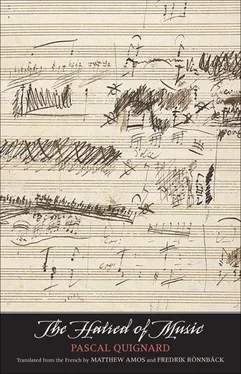Paradoxically, vibrations produced by low-frequency noise — like formerly the bombarde of organs — found in symphony orchestras and in “techno” music with amplifiers, has made part of hearing swing over into pain.

The Alberti bass broke down the chord, making it roar or bubble beneath the melody like an oceanic and hypnotic noise. The Alberti bass has become unbearable.

The already sung enchants old people. Old people are nothing but the already sung. They are no longer humans but refrains. Never before has a century so repeated the music that preceded it as this one.

The voice of the muezzin compelled the Jews just as the bells of High Mass did the Muslims.
Only atheists extol silence, which they cannot impose.

I would probably not have enjoyed Roland’s olifant, but I detest the sound of the telephone.

In Cusanus’s words: “We are like green wood. Fire in us emits more smoke than it produces light. It crackles more than it casts flames or warms. Humanity is closer to the suffering of hearing than to angelic vision.”

For the first time since the beginning of historic, which is to say narrative, time, people avoid music.

I avoid the unavoidable music.

The sonata of an old house, unaware of the generations, is of a slowness that passes down the memory of its successive inhabitants. The floor creaks. The shutters bang. Each staircase has its key. The door to the closet squeaks, and the springs of the old leather sofas respond. All the wood in the house, when summer has made it dry, forms a both regular and disordered musical instrument, which interprets a composition of distress, elaborated by a destruction all the more menacing because of its effectiveness, even if its slowness does not always make it entirely perceptible to the ears of its human inhabitants.
An old house sings a melos that, without being divine, is not on the scale of those that have been raised and that have died in it and that one has known, and who have only added their songs to daybreak, or to evening. It is a slow dirge that speaks to the family seen as a mass of several generations, in actuality, which none of the inclusive elements or private and provisional molecules truly grasps, and that moans without end about its own ruin that it announces.

When did words adapted to a set melody split from words adapted only to the rules of a language?
Words, songs, poems, and prayers arrive late.
Twenty thousand years ago, the small packs of humans who hunted, painted, and modeled animal forms would hum short phrases, execute music with the help of birdcalls, resonators, and flutes made from marrowbones, and dance their secret stories while wearing masks of prey as savage as themselves.

Vimalakirti lived at the time of Buddha, and Buddha lived at the time of Cyrus the Great. Athens had not yet founded the tragic contests of the Dionysia. Aeschylus was still a little child. Vimalakirti lived in Vaisali. He was rich. One day when a beggar monk reproached him for his wealth, the wise merchant responded that illusion is no smaller in a dreadful hermitage than in a beautiful palace.
A layman, he surpassed the monks in his understanding. He said:
“Neither the layperson’s white robe nor the monk’s kesa can be seen because everywhere everything is invisible.
“In the presence of the god no statue rises and no musician sings. When he tunes the three strings on his lute, nothing has ever resounded. Everywhere everything is inaudible.
“I do not know any statues in the temple, for there is no appearance for something so invisible. I do not know any voice for the sermon, for there is no preaching for something so silent. There is no way.”

The merchant Vimalakirti said:
“The word listener is a gratuitous affirmation. Where do you see a listener?
“There is no language that speaks to us. There is no silence that keeps it quiet.”

The merchant Vimalakirti said:
“Where is the tradition of the triple gem? It is the red ball chased by that child.
“Where is the statue of Buddha? The statue of the Delivered is like the feces coming out of that woman squatting in front of the thicket and whose facial wrinkles express her effort.
“Where is music? Music is like the word farewell in the mouth of an old man.”

The merchant Vimalakirti continued:
“What ripens music in the musician’s heart? What makes the man’s sex swell when he looks at a woman? It is not the areola and the volume of the breasts that he looks for when he watches her. It is not the scent that rises from her armpits and from her hair that attracts him when he is near her. It is not the oil of her sex that surrounds the lingua that the man seeks when he penetrates her.
“Man does not know what object he seeks in women.
“It is an illusion; that is what it is. That is what he begs for.
“This is why lovers hold hands: they hold out their hands to each other because they are begging.
“It is barely visible and it is not even tangible. It is barely audible, but impalpable. It is something tenuous, comparable to the gender agreement of adjectives. It is as delicate as a difference in timbre or register of the voice. It is a high-pitched voice, heard long ago, which characterizes all children and that male children lose, and that female children do not altogether preserve. It is a surviving high-pitched voice. Such is the illusion of the characteristics of the oral voice, taken from the lips of boys whose voices have changed and transported into musical instruments. Such is the illusion of music. Such is the mirage before the eyes of those who are lost in the desert and who still believe in man and woman. Such is the dream beneath the closed eyelids of those who are convinced of the difference between what lives and what dies, who give credence to the existence of their ancestors and who think that there is underground another world where those who go away drink, eat, sing, wail, and cry.
“There is no other world because there is no world.”

They chop wood with keys. They open doors with axes.

They have callused ears.

Human life is uproarious. We call uproars, or cities, the large conglomerations of cubes where humans accumulate. Noise 2 is their particular scent. Naples, New York, Los Angeles, Tokyo, they are the terrible music of this age.
Читать дальше













